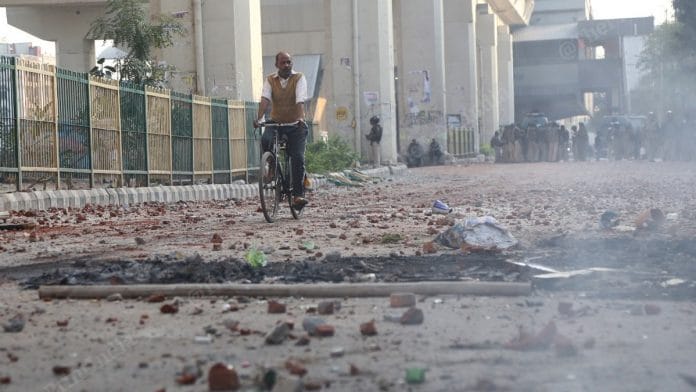New Delhi: The Delhi High Court’s judgment granting bail to Pinjra Tod activists Devangana Kalita and Natasha Narwal, and Jamia Milia Islamia student Asif Iqbal Tanha is without any foundation and appears to be based more on the social media narrative than the evidence gathered and elaborated in the chargesheet, the Delhi Police told the Supreme Court Wednesday.
In an appeal filed before the apex court in the morning, within 24 hours of the high court verdict, the Delhi Police took strong exception to the court’s view that the case related to the larger conspiracy behind last year’s riots was registered by the “Government to suppress dissent”.
“The judicial scrutiny was not to ascertain as to whether evidence on record prima facie the accusations were true or not but to somehow establish that the present case was a case of protest by students and suppression of dissent by the government of the day,” the appeal stated.
Terming the high court’s observations on police blurring the lines between a peaceful protest and terrorist activity as “unfounded and perverse,” the police said the court lost sight of the evidence and statements that were produced before it.
It asserted that the high court discarded evidence that clearly made out a “sinister plot of mass-scale riots being hatched” by the accused along with other co-conspirators.
The police also faulted the judgment for reading down the provisions under the stringent anti-terror law, Unlawful Activities (Prevention) Act [UAPA], saying it will have far-reaching consequences for cases investigated by probe agencies such as the National Investigation Agency.
“The impugned order is thus unsustainable in law and deserves to be stayed,” the appeal submitted.
Sources told ThePrint that Solicitor General Tushar Mehta is likely to mention the appeal before a vacation bench Thursday morning and ask for a stay of the HC judgment granting bail.
Meanwhile, in a related development, Kalita, Narwal and Tanha were not released from jail as the Delhi Police sought two more days to complete verification of the six sureties as well as the residential addresses of the trio. The trial court reserved its order on Delhi Police application and will be pronounced Thursday morning.
Also read: Nation’s foundations can’t be shaken by protest: Delhi HC gives bail to Kalita, Narwal, Tanha
‘High court decided case on pre-conceived, erroneous illusion’
In the HC’s view, although Kalita, Narwal and Tanha participated in anti-CAA protests, their actions could not be described as outlawed or qualify as an act of terror, as understood under the UAPA.
The court then said that even if the protests became non-peaceful or illegal, these offences can be dealt with under the other FIRs lodged against the accused under the Indian Penal Code (IPC), in which they were already on bail.
On the outcome derived by the high court while dealing with bail petitions, the Delhi Police said the court had virtually conducted a mini-trial and also given observations that were not within the preview of the pleadings.
“Unfortunately, contrary to the evidence on record and the detailed oral and written submission filed, the HC has decided the case in hand on a pre-conceived and a completely erroneous illusion, as if the present case was a simpliciter case of protest by students,” the appeal filed by the police stated.
Irrelevant considerations and not cogent evidence were appreciated while granting the accused bail, the Delhi Police added.
Also read: Delhi Police ‘reluctance’ to share info hampered relief work for riot-hit: Minorities panel
‘HC rendered findings that will jeopardise similar cases’
The HC made important observations on what is a ‘terrorist act’ under UAPA, and stated that the definition was “wide and even somewhat vague”. It cautioned against the cavalier use of the phrase to apply to criminal acts that fall squarely within the definition of conventional offences as defined under the IPC and other laws.
Strongly disapproving of the approach adopted by the high court in deciding the bail petitions, the Delhi Police said the judgment made allegations of the flippant use of UAPA for which there is no basis.
The misdirection of the court is writ large from the observations made by it and the findings rendered touch upon the merits of the matter that will jeopardise similar cases that are pending trial, claimed the appeal.
(Edited by Manasa Mohan)
Also read: Riots changed Hindu-Muslim dynamics in NE Delhi. For some, it’s ‘hateful beyond repair’ now






